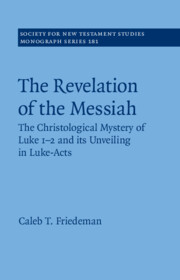Book contents
- The Revelation of the Messiah
- Society for New Testament Studies
- The Revelation of the Messiah
- Copyright page
- Dedication
- Contents
- Acknowledgments
- Author’s Note
- Abbreviations
- 1 Introduction
- 2 The Revelatory Character of Luke 1–2
- 3 The Mystery of Luke 1–2
- 4 The Use of Daniel in Luke 1–2
- 5 Preserving the Mystery
- 6 Unveiling the Mystery
- 7 Conclusion
- Bibliography
- Ancient Sources Index
- General Index
6 - Unveiling the Mystery
Published online by Cambridge University Press: 19 January 2023
- The Revelation of the Messiah
- Society for New Testament Studies
- The Revelation of the Messiah
- Copyright page
- Dedication
- Contents
- Acknowledgments
- Author’s Note
- Abbreviations
- 1 Introduction
- 2 The Revelatory Character of Luke 1–2
- 3 The Mystery of Luke 1–2
- 4 The Use of Daniel in Luke 1–2
- 5 Preserving the Mystery
- 6 Unveiling the Mystery
- 7 Conclusion
- Bibliography
- Ancient Sources Index
- General Index
Summary
In the first two chapters of Luke, characters acknowledge Jesus as Messiah, Son of God, and Lord. Lukan characters also speak of John the Baptist going before the Lord God, suggesting that Jesus might be the Lord in view, and connect Jesus with Old Testament YHWH passages. These features have made Luke 1–2 a key locus for discussions of Lukan Christology, raising the question of whether Luke presents Jesus as divine. However, they also create an apparent incongruity with the body of the Gospel. In Luke 3 and elsewhere, human characters are initially ignorant that Jesus is Messiah, Son of God, and Lord. Moreover, Jesus’ divinity – if Luke affirms it – does not seem to be recognized until after the resurrection. In this study, Caleb T. Friedeman advances a new model for understanding the christological relationship between Luke 1–2 and the rest of Luke-Acts, in which Luke presents these opening chapters as a christological mystery.
- Type
- Chapter
- Information
- The Revelation of the MessiahThe Christological Mystery of Luke 1-2 and Its Unveiling in Luke-Acts, pp. 179 - 225Publisher: Cambridge University PressPrint publication year: 2023

